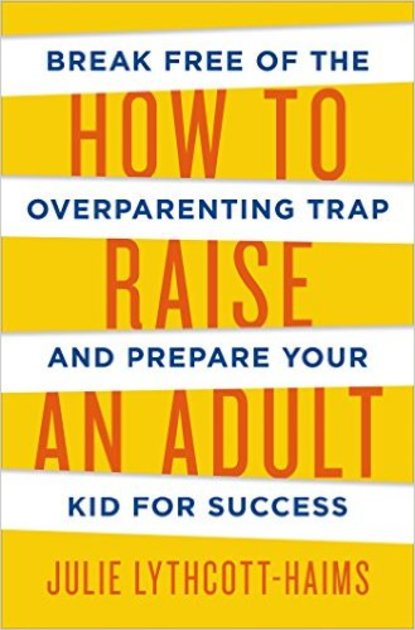
Originally printed in Queens Jewish Link 2016
How to Raise an Adult: Break Free of the Overparenting Trap and Prepare Your Kid for Success by Julie Lythcott-Haims
How to Raise an Adult looks at the trend of overparenting and its long-term effects on children and their ability to succeed as adults. Children's paths to college now start before they even begin school, including the "right" preschools, excessive homework, and diverse extracurriculars. Getting into college becomes fraught with pressure, competitive admissions, and standardized testing. There is a hyperfocus on students' grades and perfect performance, missing the point of general life education and skills. Students may feel pressured to perform academically, and led to a career that others deem successful, without the space to decide for themselves. Lythcott-Haims, as a former university dean, notes the changes in young adults today, who are often paralyzed by their dependence on their parents, and lack the ability to make decisions for themselves, speak up, and follow their own desires. Lythcott-Haims discusses the combination of factors that has led young adults today to be less independent and creative, and more anxious and depressed.
Overparenting, albeit well-meaning, is fueled by parents' fears for their children. Overparenting consists of doing things for your children that they are capable or almost capable of doing by themselves. In our Orthodox Jewish community, getting into prestigious four year universities is not usually the concern. However, I'm sure many parents can relate to the discussion of fears about their children's future, happiness, and safety. Stressors abound for students, including bullying and excessive homework. The economy is not encouraging. The news is filled with tragedies. Parents are overly cautious and protective to the point of preventing their children from becoming independent in important ways, like getting places on their own or balancing homework with household chores. It is common for parents to complete their children's homework projects. Children's safety, future, and happiness has become a major focus of their parents' lives in a different way than before. A child's safety, future, and happiness are only somewhat in their control; parents today seem to think that if only xyz is accomplished, the outcome will be predictable. But one's future, and happiness are things that are highly personal and not easily controlled, and safety would be better served if children were taught how to be safe for themselves instead of parents working eliminate all possible danger. Each individual needs to make their own decisions about what will make them happy or successful, and what makes one person happy or successful may not do it for the other. When parents make decisions for their children, children may not be happy with the decision made for them, and feel forced into their careers.
Lythcott-Haims explores how to decrease overparenting and encourage independence when raising children. Teaching children life skills includes four steps: do it for them, do it with them, watch them do it, and lastly, have them do it on their own. These steps can apply to varied life skills such as dressing yourself, learning how to use the kitchen safely, or coming home without getting lost. Furthermore, critical thinking skills are essential in being able figure things out, apply knowledge to new situations, and make decisions, especially in "grey" areas. Schools often promote rote memorization instead of critical thinking skills. You can encourage critical thinking by engaging them in conversation, listening actively and valuing their opinion and questions. You can encourage resilience by letting your children experience disappointment, and supporting them through it. For example, a teenager did not get into the high school he wanted because of his grades. He was encouraged many times to improve his grades because of upcoming applications, but he didn't put in the necessary effort in the end. His parents now have a choice- do they fight with the school to make sure he gets in despite his grades? or do they help him live with the consequences of his actions?
Reading this book made me think a lot about my own journey to independence, in addition to how I want to raise my children, and how I can encourage them to be successful in their own healthy way.
 Previous
Previous

